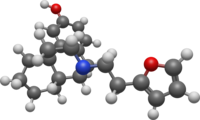This is the current revision of this page, as edited by Rambling Rambler (talk | contribs) at 18:08, 10 December 2024 (Added {{More citations needed}} tag). The present address (URL) is a permanent link to this version.
Revision as of 18:08, 10 December 2024 by Rambling Rambler (talk | contribs) (Added {{More citations needed}} tag)(diff) ← Previous revision | Latest revision (diff) | Newer revision → (diff) Chemical compound| This article needs additional citations for verification. Please help improve this article by adding citations to reliable sources. Unsourced material may be challenged and removed. Find sources: "Ro4-1539" – news · newspapers · books · scholar · JSTOR (December 2024) (Learn how and when to remove this message) |
 | |
 | |
| Legal status | |
|---|---|
| Legal status |
|
| Pharmacokinetic data | |
| Bioavailability | 70% oral IV 100% |
| Elimination half-life | 11-16h |
| Identifiers | |
IUPAC name
| |
| CAS Number | |
| PubChem CID | |
| CompTox Dashboard (EPA) | |
| Chemical and physical data | |
| Formula | C22H27NO2 |
| Molar mass | 337.463 g·mol |
| 3D model (JSmol) | |
SMILES
| |
| (verify) | |
Ro4-1539 (furethylnorlevorphanol) is an opioid analgesic drug from the morphinan series that was discovered by the pharmaceutical company Hoffmann–La Roche in the 1950s. It acts as a potent μ-opioid agonist, and was found to be around 30-60 times more potent than the related drug levorphanol in animal experiments. Although it has high potency, long duration, and good therapeutic index (1100 in animal studies), Ro4-1539 had no particular clinical advantages over other available opioid drugs, and was never commercially marketed.
Ro4-1539 has never formally undergone clinical trials in humans, but based on its effects in animals it would be expected to produce effects similar to those of other potent opioid agonists, including strong analgesia, sedation, euphoria, constipation, itching, tachyphylaxis and respiratory depression, which could be harmful or fatal. Due to potential κ-opioid agonism, it may be somewhat dysphoric and cause dissociation.
See also
- 14-Cinnamoyloxycodeinone
- 14-Phenylpropoxymetopon
- 7-PET
- N-Phenethylnormorphine
- N-Phenethyl-14-ethoxymetopon
- Phenomorphan
- RAM-378
References
- US 2970147, "3-hydroxy-N-(heterocyclic-ethyl)-morphinans", published 1961-01-31
- Nathan B. Eddy, Hedwig Besendorf and Béla Pellmont. Synthetic analgesics - Aralkyl substitution on nitrogen of morphinan. UNODC Bulletin on Narcotics 1958 p 23-42.
- Hellerbach J, Schnider O, Besendorf H, Pellmont B (1966). "Morphinans". Synthetic Analgesics. Part IIA. Pergamon Press.
- Bulletin on Narcotics October–December 1956 page 37
This analgesic-related article is a stub. You can help Misplaced Pages by expanding it. |